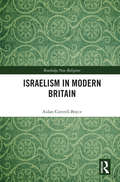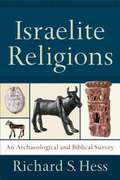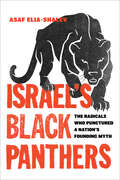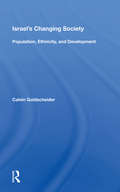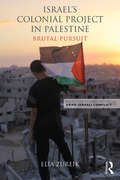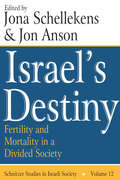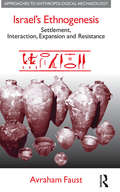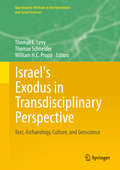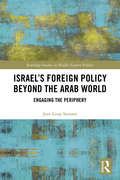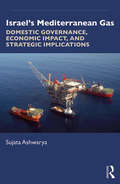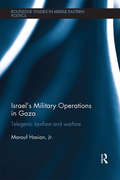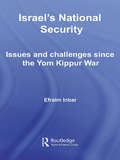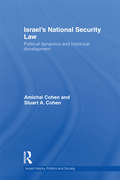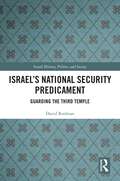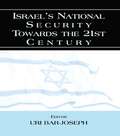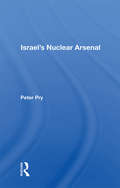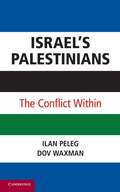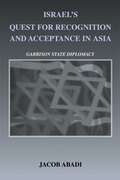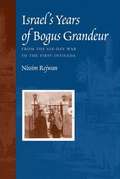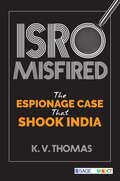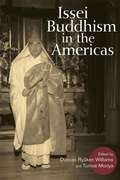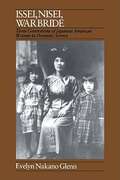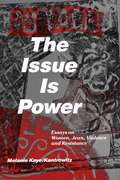- Table View
- List View
Israelism in Modern Britain (Routledge New Religions)
by Aidan Cottrell-BoyceThis book unpacks the history of British-Israelism in the UK. Remarkably, this subject has had very little attention: remarkable, because at its height in the post-war era, the British-Israelist movement could claim to have tens of thousands of card-carrying adherents and counted amongst its membership admirals, peers, television personalities, MPs and members of the royal family including the King of England. British-Israelism is the belief that the people of Britain are the descendants of the Lost Tribes of Israel. It originated in the writing of a Scottish historian named John Wilson, who toured the country in the mid-Nineteenth Century. Providing a guide to the history of British-Israelism as a movement, including the formation of the British-Israel World Federation, Covenant Publishing, and other institutions, the book explores the complex ways in which British-Israelist thought mirrored developments in ethnic British nationalism during the Twentieth Century. A detailed study on the subject of British-Israelism is necessary, because British-Israelists constitute an essential element of British life during the most violent and consequential century of its history. As such, this will be a vital resource for any scholar of Minority Religions, New Religious Movements, Nationalism and British Religious History.
Israelite Religions: An Archaeological And Biblical Survey
by Richard HessArchaeological excavation in the Holy Land has exploded with the resurgence of interest in the historical roots of the biblical Israelites. Israelite Religions offers Bible students and interested lay leaders a survey of the major issues and approaches that constitute the study of ancient Israelite religion. Unique among other books on the subject, Israelite Religions takes the Bible seriously as a historical source, balancing the biblical material with relevant evidence from archaeological finds.
Israel's Black Panthers: The Radicals Who Punctured a Nation's Founding Myth
by Asaf Elia-ShalevThe powerful story of an activist movement that challenged the racial inequities of Israel. Israel's Black Panthers tells the story of the young and impoverished Moroccan Israeli Jews who challenged their country's political status quo and rebelled against the ethnic hierarchy of Israeli life in the 1970s. Inspired by the American group of the same name, the Black Panthers mounted protests and a yearslong political campaign for the rights of Mizrahim, or Jews of Middle Eastern ancestry. They managed to rattle the country's establishment and change the course of Israel's history through the mass mobilization of a Jewish underclass. This book draws on archival documents and interviews with elderly activists to capture the movement's history and reveal little-known stories from within the group. Asaf Elia-Shalev explores the parallels between the Israeli and American Black Panthers, offering a unique perspective on the global struggle against racism and oppression. In twenty short and captivating chapters, Israel's Black Panthers provides a textured and novel account of the movement and reflects on the role that Mizrahim can play in the future of Israel.
Israel's Changing Society: Population, Ethnicity, And Development
by Calvin GoldscheiderThis book provides the most up-to-date assessment of Israel's society today, portraying the country's ethnic diversity, its economy, and demographic changes. Revealing linkages between demographic transformation and socioeconomic change, Goldscheider shows how ethnic group formation emerged in Israel to create the present mix of Jewish and Arab populations. He also reviews the policies of Palestinian and Israeli governments concerning immigration, describing the ways in which socioeconomic development within Israel, urbanization, and industrialization have evolved through the use of outside capital and increasing dependency. The book reveals two unique sets of processes about Israel today. The first concerns important changes in marriage, family and intermarriage, educational attainment and occupational achievement, ethnic politics, religion, and the changing role of women. A second but related concern pertains to the social and economic contexts of community life. Here Goldscheider investigates rapid change among Israel's major urban centers, towns, and agricultural centers, including the Kibbutz as well as Arab communities. In concluding chapters, the author discusses the role of government in shaping population policy, including health, fertility, and contraceptive and abortion issues. He also describes the influence of Jewish communities outside of Israel and the impact of the Middle East conflict with Arab states on Israel's domestic policy as well as the conflict with populations in territories administered by Israel since 1967. Likely to be a standard reference for years to come, the book is essential reading for political scientists, sociologists, anthropologists, and historians concerned with Israel's politics and society.
Israel's Colonial Project in Palestine: Brutal Pursuit (Routledge Studies on the Arab-Israeli Conflict)
by Elia ZureikColonialism has three foundational concerns - violence, territory, and population control - all of which rest on racialist discourse and practice. Placing the Zionist project in Israel/Palestine within the context of settler colonialism reveals strategies and goals behind the region’s rules of governance that have included violence, repressive state laws and racialized forms of surveillance. In Israel’s Colonial Project in Palestine: Brutal Pursuit, Elia Zureik revisits and reworks fundamental ideas that informed his first work on colonialism and Palestine three decades ago. Focusing on the means of control that are at the centre of Israel’s actions toward Palestine, this book applies Michel Foucault’s work on biopolitics to colonialism and to the situation in Israel/Palestine in particular. It reveals how racism plays a central role in colonialism and biopolitics, and how surveillance, in all its forms, becomes the indispensable tool of governance. It goes on to analyse territoriality in light of biopolitics, with the dispossession of indigenous people and population transfer advancing the state’s agenda and justified as in the interests of national security. The book incorporates sociological, historical and postcolonial studies into an informed and original examination of the Zionist project in Palestine, from the establishment of Israel through to the actions and decisions of the present-day Israeli government. Providing new perspectives on settler colonialism informed by Foucault’s theory, and with particular focus on the role played by state surveillance in controlling the Palestinian population, this book is a valuable resource for students and scholars interested in the Arab-Israeli Conflict and Colonialism.
Israel's Destiny: Fertility and Mortality in a Divided Society
by AuthorFor over a hundred years, demography has been at the heart of the Zionist project, reflected in the goal of creating and maintaining a Jewish majority in Israel and in ensuring the physical continuation of the Jewish people. Demography continues to be an essential issue in the current struggle between Israel and Palestine. Yet in academic discourse, demography is treated as a minor, largely technical side-issue in the social sciences, with little theoretical consideration given to population processes as social processes. Israel's Destiny: Fertility and Mortality in a Divided Society brings together important recent work in this area. The contributions to Israel's Destiny focus on the influence of religion, religiosity, nationalism, and ethnicity on fertility and mortality in Israel.Israel's Destiny is divided into four sections: the first focuses on fertility, particularly Israel's apparently high birth rate when compared with other countries with a similar standard of living; the second looks at patterns of nuptiality and contraception and the way marriage patterns are shaping group boundaries; the third looks at mortality, particularly among men; and the fourth looks at social policy effects of the demographic process.The main focus is that differential reproduction of the population by national and ethnic group, as well as social class--through fertility and mortality--and the social structuring of the population--through marriage patterns--are critical elements in the creation and evolution of Israeli society. The editors' introduction places all these studies in a wider perspective of current demographic research. The volume provides a concise population history of the state of Israel to help the reader put the studies in their proper local and historical context.
Israel's Ethnogenesis: Settlement, Interaction, Expansion and Resistance (Approaches To Anthropological Archaeology Ser.)
by Avraham FaustWinner (for best semi-popular book) of the 2008 Irene Levi-Sala Prize for publications on the archaeology of Israel. The emergence of Israel in Canaan is a central topic in biblical/Syro-Palestinian archaeology. However, the archaeology of ancient Israel has rarely been subject to in-depth anthropological analysis until now. 'Israel's Ethnogenesis' offers an anthropological framework to the archaeological data and textual sources. Examining archaeological finds from thousands of excavations, the book presents a theoretical approach to Israel's ethnogenesis that draws on the work of recent critics. The book examines Israelite ethnicity - ranging from meat consumption, decorated and imported pottery, Israelite houses, circumcision, and hierarchy - and traces the complex ethnic negotiations that accompanied Israel's ethnogenesis. Israel's Ethnogenesis is unique in its contribution to the archaeology of ethnicity, offering an anthropological study that will be of interest to students of history, Israelite culture and religion, and the evolution of ethnic groups.
Israel's Exodus in Transdisciplinary Perspective
by Thomas E. Levy Thomas Schneider William H.C. ProppThe Bible's grand narrative about Israel's Exodus from Egypt is central to Biblical religion, Jewish, Christian, and Muslim identity and the formation of the academic disciplines studying the ancient Near East. It has also been a pervasive theme in artistic and popular imagination Israel's Exodus in Transdisciplinary Perspective is a pioneering work surveying this tradition in unprecedented breadth, combining archaeological discovery, quantitative methodology and close literary reading. Archaeologists, Egyptologists, Biblical Scholars, Computer Scientists, Geoscientists and other experts contribute their diverse approaches in a novel, transdisciplinary consideration of ancient topography, Egyptian and Near Eastern parallels to the Exodus story, the historicity of the Exodus, the interface of the Exodus question with archaeological fieldwork on emergent Israel, the formation of biblical literature, and the cultural memory of the Exodus in ancient Israel and beyond. This edited volume contains research presented at the groundbreaking symposium "Out of Egypt: Israel's Exodus Between Text and Memory, History and Imagination" held in 2013 at the Qualcomm Institute of the University of California, San Diego. The combination of 44 contributions by an international group of scholars from diverse disciplines makes this the first such transdisciplinary study of ancient text and history. In the original conference and with this new volume, revolutionary media, such as a 3D immersive virtual reality environment, impart innovative, Exodus-based research to a wider audience. Out of archaeology, ancient texts, science and technology emerge an up-to-date picture of the Exodus for the 21st Century and a new standard for collaborative research.
Israel’s Foreign Policy Beyond the Arab World: Engaging the Periphery (Routledge Studies in Middle Eastern Politics)
by Jean-Loup SamaanFor over 60 years, Israel’s foreign policy establishment has looked at its regional policy through the lens of a geopolitical concept named "the periphery doctrine." The idea posited that due to the fundamental hostility of neighboring Arab countries, Israel ought to counterbalance this threat by engaging with the "periphery" of the Arab world through clandestine diplomacy. Based on original research in the Israeli diplomatic archives and interviews with key past and present decision-makers, this book shows that this concept of a periphery was, and remains, a core driver of Israel’s foreign policy. The periphery was borne out of the debates among Zionist circles concerning the geopolitics of the nascent Israeli State. The evidence from Israel’s contemporary policies shows that these principles survived the historical relationships with some countries (Iran, Turkey, Ethiopia) and were emulated in other cases: Azerbaijan, Greece, South Sudan, and even to a certain extent in the attempted exchanges by Israel with Gulf Arab kingdoms. The book enables readers to understand Israel’s pessimistic – or realist, in the traditional sense – philosophy when it comes to the conduct of foreign policy. The history of the periphery doctrine sheds light on fundamental issues, such as Israel’s role in the regional security system, its overreliance on military and intelligence cooperation as tools of diplomacy, and finally its enduring perception of inextricable isolation. Through a detailed appraisal of Israel’s periphery doctrine from its birth in the fifties until its contemporary renaissance, this book offers a new perspective on Israel’s foreign policy, and will appeal to students and scholars of Middle East Politics and History, and International Relations.
Israel’s Mediterranean Gas: Domestic Governance, Economic Impact, and Strategic Implications
by Sujata AshwaryaThis book examines the internal and external implications of Israel’s natural gas discoveries in the Eastern Mediterranean. The nation’s changed status from being an importer of coal and oil to that of an exporter of natural gas has consequences not only for the energy sector but also for the fragile geopolitics of the region. The book: Explores the challenges and issues of energy economics and governance; Analyses Israel’s gas diplomacy with its neighbours in the Middle East and North Africa and its potential positive impact on the amelioration of the Arab-Israeli conflict; Studies how Israel can avoid the deleterious impact of the Dutch disease once the government’s share of the export revenues start flowing. The author traces a consummate picture of history, politics, and conflicts that shape the economics of energy in Israel and its future trajectories. A major intervention in Middle East studies, this volume will be of great interest to scholars and researchers of energy studies, development studies, strategic studies, politics, diplomacy, and international relations. It will also be of interest to government agencies, think-tanks, and risk management firms.
Israel's Military Operations in Gaza: Telegenic Lawfare and Warfare (Routledge Studies in Middle Eastern Politics)
by Marouf Hasian JrCivilians in Gaza and Israel are caught up in complex, violent situations that have overstepped conventional battle lines. Both sides of the conflict have found ways to legitimate the use of violence, and continually swap accusations of violations of domestic and international humanitarian laws. Israel’s Military Operations in Gaza provides an ideological critique of the legal, military, and social media texts that have been used to legitimate historical incursions into the Gaza, with special focus on Operation Protective Edge. It argues that both the Palestinians and the Israelis have deployed various forms of ‘telegenic’ warfare. They have each used argumentative rhetorics based on competing interpretations of events, and are locked in a battle to convince international audiences and domestic constituencies of the righteousness of their causes. This critical genealogical study analyses a range of texts and images, from selfies circulated near the Gaza border to judicial opinions produced by the High Court of Israel. With its multidisciplinary approach and original analysis of the Israel/Gaza situation, this book will be of interest to students and scholars of Middle East studies and the Arab-Israeli conflict, as well as security studies and communication studies.
Israel's National Security: Issues and Challenges Since the Yom Kippur War (Israeli History, Politics and Society)
by Efraim InbarThis volume presents a comprehensive analysis of Israel's security challenges since the 1973 October War. Efraim Inbar takes the reader on a historical journey through Israel's relations in the Middle East that begins with an analysis of Israel's strategic thinking after 1973 and ends with an important look at the recent Second Lebanese War and the Iranian nuclear challenge. Israel's National Security delves not only into Israel's responses, but also its relationships in the international community, providing a complete picture of how Israel's strategic environment has evolved over time. Relevant to today's current political atmosphere, the volume dissects the influences of the growing appeal of Islamic extremism on the peace process, Israel strategic partnerships with India and Turkey, and Israel's relations with the Palestinians.
Israel's National Security Law: Political Dynamics and Historical Development (Israeli History, Politics and Society)
by Stuart Cohen Amichai CohenTerror attacks on western civilian targets have stimulated interest in the dilemmas faced by liberal societies when combating threats to national security. Combining the perspectives of political science and law, this book addresses that discourse, asking how democracies seek to harmonize the protection of individual liberties with the defence of state interests. The book focuses on the experience of Israel, a country whose commitment to democratic values has continuously been challenged by multiple threats to national survival. It examines the legal, legislative and institutional methods employed to resolve the dilemmas generated by that situation, and thus provides a unique interpretation of Israeli national security behaviour. Policy-making and policy-implementation in this sphere, it shows, have reflected not just external constraints but also shifts in the domestic balance of power between the executive, the legislature and the judiciary. The book concludes with an agenda of the measures that each branch of government needs to implement in order to repair the flaws that have developed in this system over time. Based on a close reading of legislative and court readings, the book proposes a new taxonomy for the analysis of national security legal frameworks, both in Israel and elsewhere in the democratic world. As such it will be of great interest to students and scholars of political science, national security law, Israeli history and civil-military relations.
Israel's National Security Predicament: Guarding the Third Temple (Israeli History, Politics and Society)
by David RodmanThis book provides a ground-breaking assessment of the Israeli national security experience from the establishment of the country through to the present day. Seventy-five years after its establishment, the State of Israel continues to face an acute national security predicament as a result of the still unresolved Arab–Israeli conflict. This monograph offers a new framework for analyzing this experience, first exploring the crucial events of the past and present that define it, including interstate wars, asymmetrical wars, low-intensity conflicts, and developments in weapons of mass destruction. The book then probes how Israel’s evolving national security doctrine has addressed these various challenges over the years, highlighting the roles of a number of variables: deterrence, warning, and decision; strategic depth and defensible borders; the quality and quantity of fighting men and machines; intelligence; self-reliance in military matters; foreign policy; and the influence of ethnic demography, societal resilience, economic prosperity, and water security. Written in accessible, non-technical language, the book will appeal to general readers seeking an introduction to Israeli security, as well as to specialists and researchers in various fields, including Israeli history, Middle Eastern politics, and security studies.
Israel's National Security Towards the 21st Century
by Uri Bar-JosephThis volumes discusses three principal issues: the Israeli army and the Revolution of Military Affairs (RMA); Israel's present and future answers to the threays of weapons of mass destruction (WMD); and the impact of societal, political, and technological changes on Israel's future war objectives.
Israel's Nuclear Arsenal
by Peter PryIsrael's Nuclear Arsenal is a full inquiry into the likely size and sophistication of the Israeli nuclear weapons program. Among the key questions it addresses are: Did other nations—the United States, France, or West Germany, for example—assist Israel in developing its nuclear weapons capacity? What is the nature of Israel's industrial nuclear inf
Israel’s Palestinians
by Dov Waxman Ilan PelegArguing that a comprehensive and lasting solution to the Israeli-Palestinian conflict depends on a resolution of the Jewish-Palestinian conflict within Israel as much as it does on resolving the conflict between Israel and Palestinians in the Occupied Territories, this timely book explores the causes and consequences of the growing conflict between Israel's Jewish majority and its Palestinian-Arab minority. It warns that if Jewish-Arab relations in Israel continue to deteriorate, this will pose a serious threat to the stability of Israel, to the quality of Israeli democracy and to the potential for peace in the Middle East. The book examines the views and attitudes of both the Palestinian minority and the Jewish majority, as well as the Israeli state's historic approach to its Arab citizens. Drawing upon the experience of other states with national minorities, the authors put forward specific proposals for safeguarding and enhancing the rights of the Palestinian minority while maintaining the country's Jewish identity.
Israel's Quest for Recognition and Acceptance in Asia: Garrison State Diplomacy (Israeli History, Politics and Society #No. 34)
by Jacob AbadiThis title represents a comprehensive study of Israel's attempts to build diplomatic relations with countries on the Asian continent. The author argues that, despite the persistence of the Arab Israeli conflict, the Israeli Foreign Ministry was remarkably successful in gaining recognition in most Asian countries. He provides an overview of Israel's relations with Asian countries from 1948 until the present, and analyses the political, social and economic factors in each country and the role that each played in the process of rapprochement with Israel. He explores the reasons for Israel's successes as well as its failures, and analyses the flaws in Israeli diplomacy.
Israel's Security Networks
by Gabriel Sheffer Oren BarakSince the establishment of the State of Israel in 1948, and particularly after the Israeli-Arab War of 1967, a highly informal but simultaneously potent security network has influenced Israel's domestic sphere. Composed of acting and former security personnel and their partners in the state's various civilian spheres, this security network has affected Israeli culture, politics, society, economy, public discourse and foreign relations. This book discusses this major sociopolitical phenomenon and its effects in a comparative and theoretical perspective. First, it defines Israel's security network in a broad theoretical and comparative perspective. Second, it explains how Israel's security network emerged and acquired a hegemonic position in the area of national security and foreign policy. Third, it describes the security network and identifies its members. Fourth, it discusses and explains the multitude of roles that Israel's security network has come to play both domestically and externally. Fifth, it discusses similar phenomena in other relevant cases. Finally, it presents general analytical and theoretical conclusions.
Israel's Years of Bogus Grandeur: From the Six-Day War to the First Intifada
by Nissim Rejwan foreword by Nancy E. BergOn the eve of the Six-Day War in 1967, Israel was nineteen years old and as much an adolescent as the average nineteen-year-old person. Issues of identity and transition were the talk among Israeli intellectuals, including the writer Nissim Rejwan. Was Israel a Jewish state or a democratic state? And, most frustratingly, who was a Jew? As Nancy Berg's foreword makes clear, these issues became more critical and complex in the two decades after the war as Israel matured into a regional power. Rejwan, an Iraqi-born Jew whose own fate was tied to the answers, addresses the questions of those days in his letters, essays, and remembrances collected in Israel's Years of Bogus Grandeur. Israel's overwhelming victory in 1967 brought control of the former Palestinian territories; at the same time, Oriental Jews (i. e. , those not from Europe) became a majority in the Israeli population. The nation, already surrounded by hostile, recently humiliated Arab neighbors, now had an Arab majority (Jewish, Muslim, Druze, and Christian) within its borders--yet European Jews continued to run the country as their own. Rejwan wrote tirelessly about the second-class status of Arab Israelis (and especially of Arab Jews), encouraging a more inclusive attitude that might eventually help heal the wounds left by the Six-Day War. His studies in sociology at Tel Aviv University informed his work. For his cause, Rejwan lost his job and many of his friends but never his pen. Through Munich, Entebbe, political scandals, economic crises, and the beginning of the Intifada, Rejwan narrates Israel's growing pains with feisty wit and unwavering honesty.
ISRO Misfired: The Espionage Case That Shook India
by K. V. ThomasWINNER: Third position, Reader’s Choice Awards 2020 (General Nonfiction category) by TCK Publishing An infamous espionage case took the country by storm in 1994 and destroyed the lives and careers of many people. It has finally been put to rest after 25 years. The main accused, Nambi Narayanan, was vindicated and in compliance with the Supreme Court’s order, received Rs50 lakh compensation from the Kerala Government. He was also awarded the Padma Bhushan in 2019. But was all this too late? And what about the others who were accused? Has their honour been restored? Do we know the full story yet? Ex-IB officer K. V. Thomas reveals the long saga of interrogations, investigations and legal battles. Full of original disclosures, the book exposes deep secrets and closed-door conversations of India’s most sensational spy case.
Issei and Nisei: The Settling of Japanese America
by Ronald T. TakakiThe history of Japanese people in America.
Issei Buddhism in the Americas
by Tomoe Moriya Duncan Ryuken WilliamsRich in primary sources and featuring contributions from scholars on both sides of the Pacific, Issei Buddhism in the Americas upends boundaries and categories that have tied Buddhism to Asia and illuminates the social and spiritual role that the religion has played in the Americas. While Buddhists in Japan had long described the migration of the religion as traveling from India, across Asia, and ending in Japan, this collection details the movement of Buddhism across the Pacific to the Americas. Leading the way were pioneering, first-generation Issei priests and their followers who established temples, shared Buddhist teachings, and converted non-Buddhists in the late nineteenth and twentieth centuries. The book explores these pioneering efforts in the context of Japanese diasporic communities and immigration history and the early history of Buddhism in the Americas. The result is a dramatic exploration of the history of Asian immigrant religion that encompasses such topics as Japanese language instruction in Hawaiian schools, the Japanese Canadian community in British Columbia, the roles of Buddhist song culture, Tenriyko ministers in America, and Zen Buddhism in Brazil. Contributors are Michihiro Ama, Noriko Asato, Masako Iino, Tomoe Moriya, Lori Pierce, Cristina Rocha, Keiko Wells, Duncan Ryûken Williams, and Akihiro Yamakura.
Issei, Nisei, War Bride: Three Generations of Japanese American Women in Domestic Service
by Glenn Evelyn NakanoThree Generations of Japanese American Women in Domestic ServiceEvelyn Nakano GlennA richly detailed and sophisticated examination of. . . how historical and economic forces restricted women's lives and how women devised strategies for dealing with their plight. --Canadian Woman StudiesIn this unique study of Japanese American women employed as domestic workers, Evelyn Nakano Glenn reveals through historical research and in-depth interviews how the careers of these strong but oppressed women affected the history of Asian immigration in the San Francisco-Bay Area. Three generations of women speak in their own words about coping with degraded employment and how this work related to family and community life. The disproportionate concentration of Japanese American women in domestic service from the early part of this century to the present resulted from their status as immigrants and women of color in a race and gender stratified local labor market. The three generations covered by this study--pre-1924 immigrants (issei), first American born generation (nisei), and post-World War II immigrants (war brides)--were subjected to multiple forms of oppression but were not appendages of men nor passive victims. Dr. Glenn shows how their struggles to achieve autonomy, dignity, and a suitable livelihood were essential to the survival of the family and the community. Although unique in many ways, the situation of the Japanese American woman has important parallels with that of other women of color in the United States. Ironically her role as a domestic cast her in a menial, degraded job but often elevated her to the position of valued confidant to her employer. Issei, Nisei, War Bride is the first study to offer a sociological/historical perspective on these women. It addresses issues about the nature of labor systems in capitalist economies, the role of immigrant and racial ethnic women in those systems, and the consequences of participation in race and gender stratified systems for minority families and communities. ReviewsA beautifully written, well-organized, and sociologically rich study of three generations of Japanese-American women who worked as domestics. Glenn's study fits well into a women's studies collection, particularly with those materials focusing on immigrants or the working class. --Choice. . . A much welcome contribution to the literature on women and work and on Japanese American women, in particular. Glenn has artfully combined a rich case study approach with detailed sociodemographics in an historical framework. . . . Glenn writes well and skillfully incorporates detailed historical and demographic facts with a descriptive style. The presentation of labor statistics is excellent. . . . This book is an important contribution, not only to Asian American Studies but to women's studies and the literature on labor and immigrant groups. --Amerasia JournalA revealing view into the role of Japanese women immigrants in the United States not only as domestic workers but also in their family lives. This study is enlivened by the life stories and quotations from the women themselves. . . --Edwin O. ReischauerThis work is a valuable contribution to the literature on immigration and an important addition to the literature on occupations. It contains a fascinating and highly readable account of the array of perspectives on work and family that Glenn was uniquely positioned to collect from Japanese women and provides an extremely useful study for those who teach women and work, gender roles, and sociology of occupations courses. --Arlene Kaplan DanielsAbout the Author(s)Evelyn Nakano Glenn is Associate Professor of Sociology at State University of New York at Binghamton.
The Issue is Power: Essays on Women, Jews, Violence and Resistance
by Melanie Kaye KantrowitzPolitical activist and writer Melanie Kaye/Kantrowitzbrought an insightful eye and a sharp analytical mind to probe the problems facing America at the turn of the century. First published in 1992, the hard-hitting essays in this collection scan the connections across a wide range of issues: whether the topic is class, racism, Israel and Palestine, war, anti-Semitism, violence against women or violence by women, the issue is power—in all its complexity. Now in its second edition and no less relevant nearly three decades later, her work—dedicated, persistent—continues to remind us of the strength in community.“Beginning at the intersection of sex, race, class, ethnicity, and sexual orientation, Kaye/Kantrowitz asks hard questions in these essays about power, violence, resistance, and victimhood. ... At the core of The Issue Is Poweris a smart, engaged observer of the world who invites us to think and act with her.”—from the new foreword byJulie R. Enszer“Here is a book for everyone who dares to want to help make history. Melanie Kaye/Kantrowitzis passionate, strategic, pithy, generous, realistic, controversial, unquenchable—like the best of our movements for change. As a writer and lifelong doer, she gives us reasons to believe in achievable justice, and maps for acting on that belief.”—Adrienne Rich
